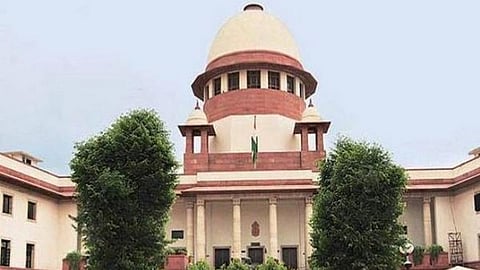

NEW DELHI: The Supreme Court on Thursday said it will decide the constitutional validity of penal provisions in the Indian Penal Code (IPC) and the Bharatiya Nyaya Sanhita (BNS) which grant immunity from prosecution to a husband for the offence of rape if he forces his wife, who is not a minor, to have sex with him.
A three-judge bench of the apex court, led by Chief Justice of India (CJI) D Y Chandrachud and Justices J B Pardiwala and Manoj Misra, sought views of the petitioners on Centre's submission that making such acts punishable would severely impact the conjugal relationship and cause serious disturbances in the institution of marriage.
Senior advocate Karuna Nundy, appearing for one of the petitioners, submitted the provisions of the IPC and BNS on marital rape.
The Central government, in its affidavit filed in the apex court on October 3, had opposed the batch of pleas against the criminalisation of marital rape, on the ground that there are already "suitably designed punitive measures" in place in the sensitive issue.
"We see no necessity to criminalize marital rape, as there are already suitably designed punitive measures in place," the Union of India (UOI) had told the apex court.
It said that the issue is primarily social rather than legal. Opposing the batch of pleas, the UOI said, "Criminalising marital rape would have significant implications for society. The jurisdiction to criminalise such acts (marital rape) does not lie with the Supreme Court but rather with the legislature."
It further added that the present question is not only a constitutional question but essentially a social question on which the Parliament after being apprised and being aware of all sides of the opinion on the present issue, has taken a position.
The Centre further in its affidavit said that the Parliament, after being apprised and being aware of all sides of the opinion on the present issue has decided to retain Exception 2 to Section 375 of IPC in 2013 while amending the said section in the year 2013.
It further made it clear in its affidavit to the apex court that striking down Exception 2 of Section 375 of IPC on the grounds of its constitutional validity will have a far-reaching effect on the institution of marriage.
"It may severely impact the conjugal relationship and may lead to serious disturbances in the institution of marriage. In the fast-growing and ever-changing social and family structure, misuse of the amended provisions can also not be ruled out, as it would be difficult and challenging for a person to prove whether consent was there or not," the centre said.
The marital rape issue cannot be decided without proper consultation with all the stakeholders in the case or taking the views of all the stakes into consideration, the Union said.
There was a batch of pleas pending in the top court for the hearing, including that of AIDWA challenging the marital rape exception under the new criminal laws.
Two-judge Bench of the Delhi High Court on May 12, 2022, in its verdict, had pronounced a split judgement on the issue related to criminalising marital rape. Delhi HC's Judge Justice Rajiv Shakdher ruled in favour of criminalising it, while Justice C Hari Shankar disagreed with the opinion and held that Exception 2 to Section 375 does not violate the Constitution as it is based on intelligible differences.
After this, many petitions were filed before the Supreme Court, challenging the Delhi HC verdict and sought appropriate orders and directions, including that of making marital rape as offence.